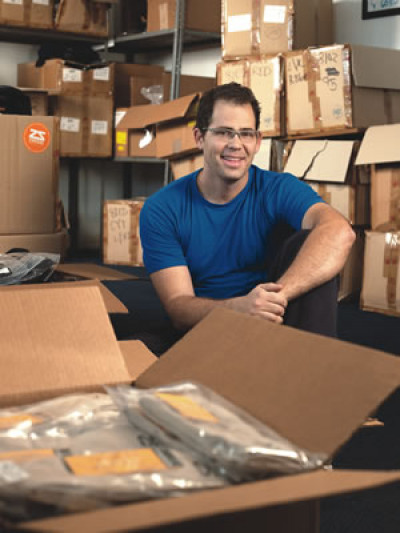SHARE:
Credit Crunch
Entrepreneurs Turning to Their Peers for Cash
 Ryan Feig turned to a peer-to-peer lender to expand his company’s apparel inventory. [Photo: Daniel Portnoy] |
Ryan Feig, 34, an MBA graduate of Babson College, launched his Hialeah-based high-performance apparel company three years ago using credit cards and savings. His company, Zensah, uses a breathable, moisture-wicking fabric to make seamless shirts, shorts, socks and other clothing. In 2006, Feig approached his local bank for a loan to build inventory. “The banks just were not interested,” he says.
This year, Feig turned to the Lending Club, a startup peer-to-peer, or P2P, lending company based in Sunnyvale, Calif. Online P2P sites — others include Prosper Marketplace and Zopa— let entrepreneurs borrow $500 to $25,000 from individual lenders who want to earn more than the interest rate paid by bank savings or CDs but don’t want to invest in the stock market.
Borrowers set the interest rate they’re willing to pay, and individual lenders bid for the opportunity to give them money. Feig borrowed $12,000 at 10.5% with a payback period of three years. To allow lenders to get a sufficient return, borrowers can’t pay off the loan for the first six months. Fifteen individuals comprised his lending pool, putting in $200 to $3,000 each. There was also a social networking aspect for Feig because Lending Club originally launched on Facebook, allowing lenders and borrowers to get together based on common hometowns, schools or interests.
Banks have tightened lending standards significantly in the wake of the real estate lending collapse, posing even greater challenges to small businesses that already have a tough time finding startup or expansion money.
Christopher Ramey, chairman of the Florida Luxury Marketing Council in Coral Gables, says that businesses that serve the construction industry began facing a “triple whammy” in the fourth quarter of 2006 and things have only become worse. First, they must deal with customers who have less money to spend; banks are less willing to extend lines of credit; and suppliers aren’t extending credit. “A flooring contractor has more difficulty getting credit from a flooring manufacturer,” Ramey says.
Investment banker Michael Turner, who works with businesses with assets of $25 million to $300 million at his Tampa firm, Farlie Turner, recently opened a unit to work with distressed companies. “We believe many companies are saddled with enough debt that they cannot make any missteps,” says Turner. His company’s Special Situations Group will help with refinancing, the sale of a unit or sale of the entire company. He says, “Businesses in general will have fewer options to finance themselves if they fall into trouble.”





 - Free Downloads
- Free Downloads
